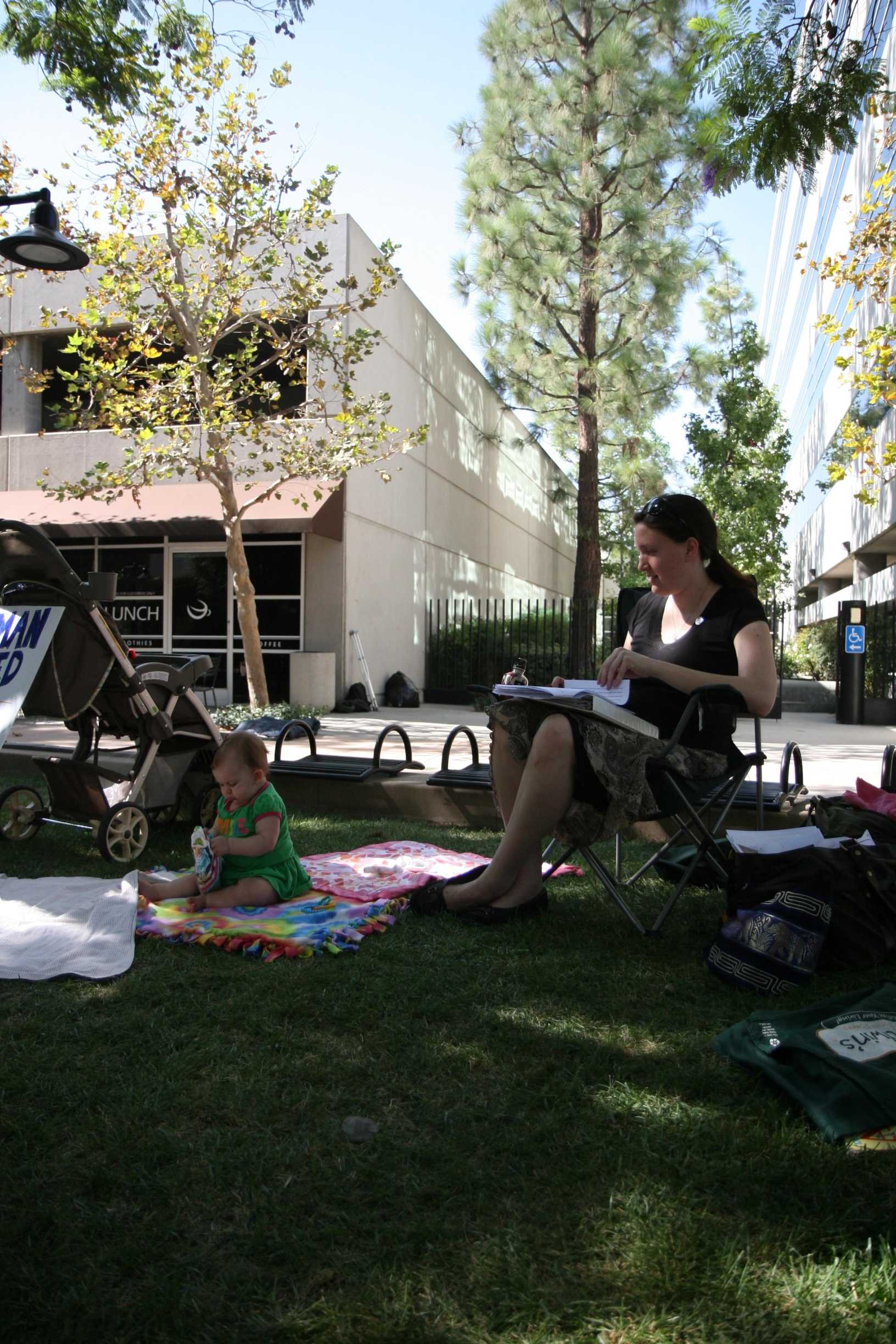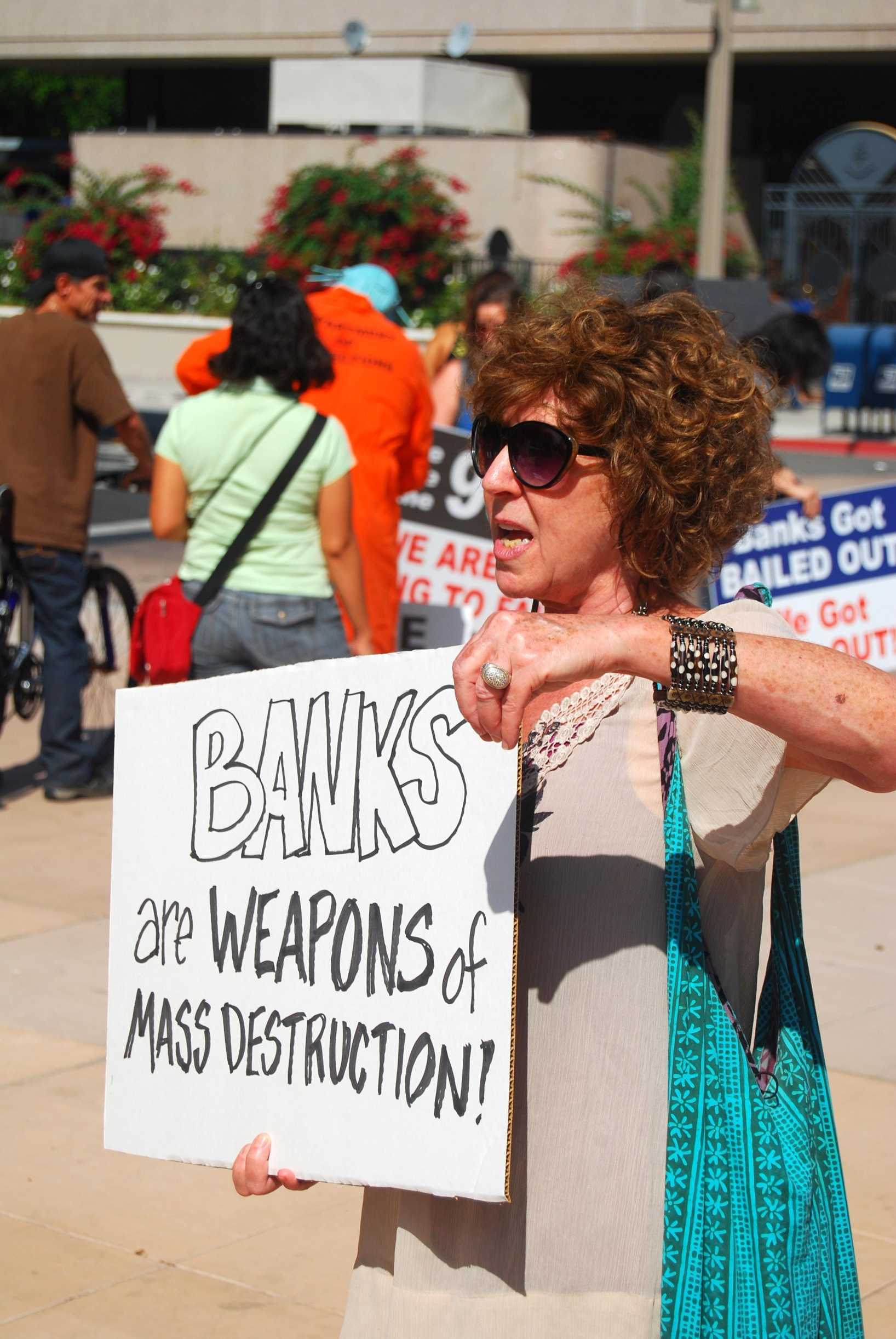By Samuel Finch / Staff Writer

Elizabeth Aamot grades papers during a period of downtime at Occupy Riverside on Oct. 17 while her daughter Evangeline plays nearby. (Samuel Finch)
By Samuel Finch / Staff Writer
“We are the 99 percent.”
This simple phrase echoed through the open pedestrian mall near University Avenue in downtown Riverside on the afternoon of Oct. 15. But who were these 200 plus individuals who converged with the intention to occupy the space indefinitely?
As one looked at the faces of the energetic mass, no one word could be used to describe the sight.
Students and professors, artists and office workers, employed and unemployed chanted and cheered side-by-side, picket signs in hand.
A month after Occupy Wall Street commenced in New York City, residents of Riverside and surrounding cities who identify with the movement organized in leaderless spontaneity to make their voices heard.
Among the multitude gathered, Brian Judson and Elizabeth Aamot stood with their 6-month-old daughter, Evangeline, just one of nearly a dozen children in attendance.
Judson and Aamot, both in their 20s, attended at different times throughout Saturday’s events. Evangeline watched on from their laps, smiling and chewing on anything within her reach.
“She’s teething,” Judson said with a laugh as his daughter bit down on the bottle of milk he offered her.
Judson works full time as an assistant manager at a Rubio’s restaurant location in Redlands.
After double majoring in sociology and Spanish language at UC Riverside, he graduated in June 2010 with hopes of working for the state of California.
Less than a month later, a statewide hiring freeze was issued by then Governor Arnold Schwarzenegger.
Following the events of Occupy Wall Street, Judson decided to join the newly formed local demonstrations.
“I think we need to get our priorities straight and and I think if enough people show up who feel the same, Washington is going to have to see that we’re sick of it,” he said of the movement. “We’re fed up. We’re drawing a line.”
“The people who are really hurting right now are the people who are working 40 hours close to minimum wage, barely making ends meet, deciding which bills to pay every month.”
When asked what he would liked to see in his daughter’s future he responded, “she’s six months old and she growing fast. All I can hope for is that this movement succeeds in curbing corporate greed that has come into every aspect of our lives.”
In the calm of the evening, Elizabeth Aamot arrived after a day of job training. Evangeline grabbed and pulled on readily available strands of her mother’s hair as she spoke.
“I was told since I was a little girl that if I stayed in school and did well and went to college I would get a good job,” Aamot said. “Then once I got in college I found that I needed to go to grad school to get a good job. So I went to grad school and graduated and still there was no full-time work available to me.”
Aamot works part time as an English instructor at San Bernardino Valley College in addition to working part time for a private test preparation company.
“I know that a lot of people, especially younger people who are just coming out of college or graduate school, are in a situation where they can’t find full-time work and it’s almost becoming normal for people to have to work two or three or jobs,” she said.
“Once I was working four part-time jobs all at once just to pull together enough money to support myself. That’s not the way it should be. There should be full-time work available for people who want it.”
Despite her busy schedule, Aamot said that she hopes to come down as often as possible with her family.
“I intend to come down here and bring my stack of papers and do my grading. And I’ll play with my baby. She likes to be outdoors.” She looked around at those gathered. “These are good people.”
During a lull in the day’s events, Elena Carrillo sat beneath a tree, a blanket strewn with informational leaflets for “Womyn of Color for Decolonization” spread out before her. Carrillo majors in gender studies at Riverside City College.
“Our goal is to work against all oppression,” she said of her committee, “and one oppression that hurts everyone is the social class system.”
“It’s difficult for me to talk about being the 99 percent as a Mexican-American because I feel privileged among my brothers and sisters,” Carrillo said. “I have medical care and I own a car and I get some financial aid from the school. I’m so grateful for the positive things in my life. I am a privileged Chicana.”
Many members of the Occupy Riverside protests continually praised the police as being part of the people being fought for. Carrillo, however, had difficulty with these praises.
“It is difficult as a woman of color to share the praise towards the police officer because others don’t realize the relationship that people of color have with the cops.”
Still, she stands firmly with the movement in hopes of producing radical change.
“I highly encourage the students of the Riverside Community College District to take part in this movement,” she said. “As students we feel the gap between the 99 percent and the one percent. We need to take it upon ourselves to make a difference.”
Over the course of the day, Jonathan Grell strode through the crowd grasping a hand-held transceiver and labeled as security by a strip of red masking tape wrapped around his arm.
“I couldn’t feel better about my community,” he said.
Upon first glance, one might not realize that Grell, 23, was diagnosed with testicular cancer in May. At the time he was a student at CU Boulder studying international affairs.
“I was pretty much dropped with ‘you have testicular cancer’. It’s not something you really expect,” he said.
When he found out, he came home to his family.
“I have a lot of friends in Colorado, but I just didn’t have the full on support system,” he said. Soon after he began treatment at Cedars Sinai Medical Center.
“June rolled around and I had my first surgery. Then came July and chemotherapy initiated. Chemo ended in mid-August,” Grell said. “I had a month to take a breath. After that I had my last surgery, literally two weeks ago. Actually, I’m still recovering from it.”
“But as I’m recovering, I came to realize that my country is beginning to turn into a coast to coast revolt,” he said. Though interested by grassroots movements, Grell had never found one to join.
“My personal apathy came from the fear that I’d call a revolution and nobody would come,” he admitted.
“I found out about this through a high school friend’s mom on Facebook and figured I’d show. I mean, Occupy Riverside? No way” he said with a laugh. “But I showed up to a general assembly and there was like a hundred people at the meeting.” And the numbers grew from there.
“The United States is on the cusp of something different,” he said.
As the sun set on the first day of the Riverside camp, people gathered for a general assembly to vote on proposed actions utilizing an echoed speech technique known as the “people’s mic” to ensure that the message was heard by all.
Though the individual protesters held different opinions on some issues, they all agreed that change was needed. And they all agreed that Riverside had become occupied territory.

Stephanie Kay displays her picket sign near University Avenue at Occupy Riverside on Oct. 15. (Jacob Willson / Asst. Photo editor )






